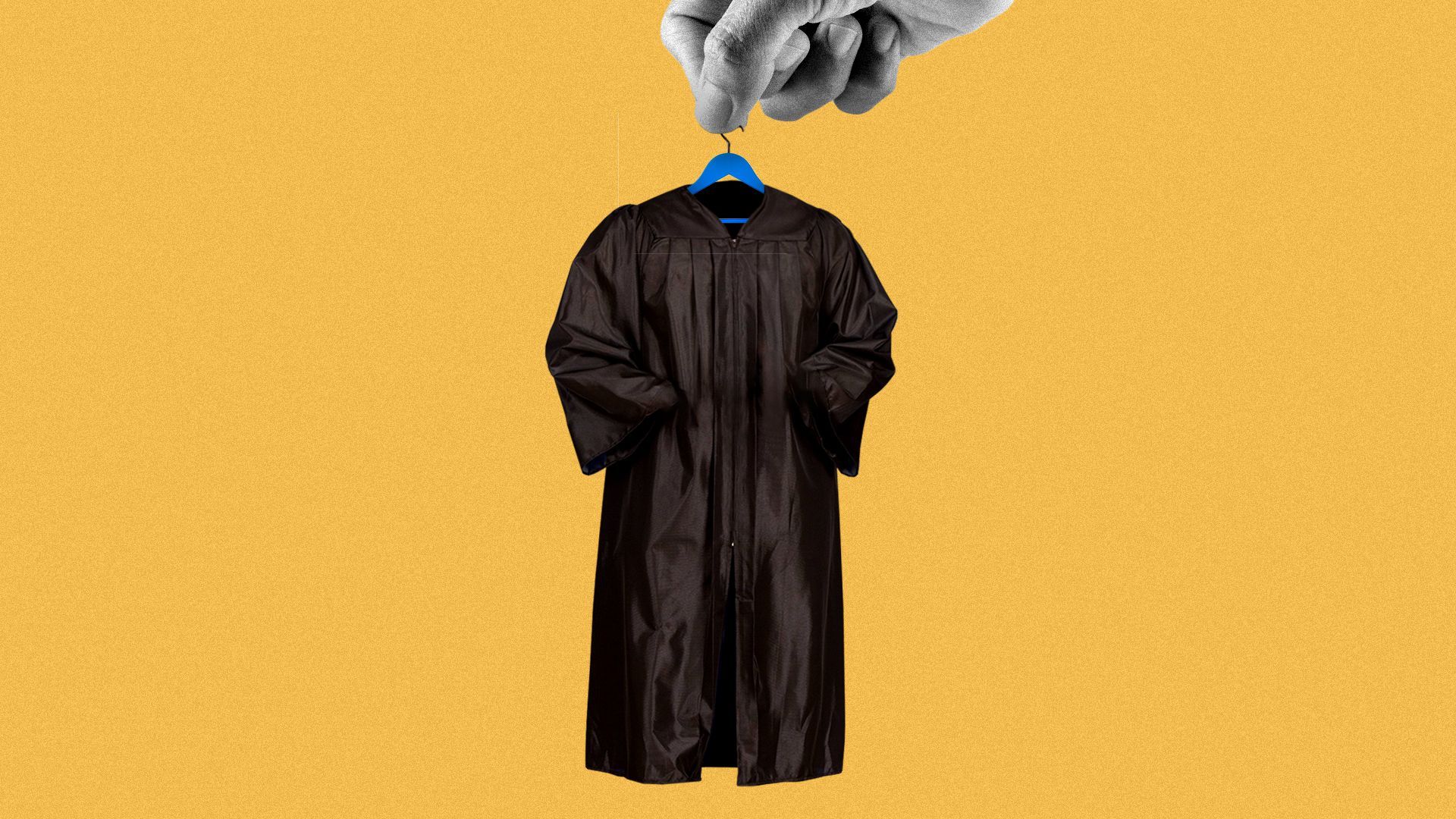| | | | | | | Presented By Goldman Sachs 10,000 Small Businesses Voices | | | | Axios Sneak Peek | | By Alayna Treene and Hans Nichols ·Jul 22, 2021 | | Welcome back to Sneak. It's been a second day of select-committee recriminations. Smart Brevity™ count: 1,375 words ... 5 minutes. Edited by Glen Johnson. | | | | | | 1 big thing: Biden's quiet court drive |  | | | Illustration: Annelise Capossela/Axios | | | | President Biden and the Democratic-controlled Senate have installed more federal judges during the first six months of his presidency than any administration since Richard Nixon's, Axios' Jonathan Swan, Sam Baker and Hans Nichols report. Why it matters: While Democrats may spend more time talking publicly about vaccines and infrastructure, the rapid pace of both nominations and confirmations shows judges are one of the party's most urgent priorities. President Trump pushed through his own slate of judges to boost conservatives for decades. By the numbers: Biden has had eight federal judges confirmed since taking office Jan. 20. - Six months into their presidencies, Trump and George H.W. Bush had each appointed four judges. Presidents Obama, George W. Bush and Ronald Reagan hadn't appointed any.
Chief of Staff Ron Klain and White House counsel Dana Remus — in coordination with the Senate Judiciary Committee — are intensely focused on accelerating Biden's efforts to appoint as many judges as possible. - The emphasis isn't just on speed but also on adding diversity that's lacking on the federal bench.
Between the lines: "There has historically been this view of a certain path to a judgeship that can be over-representative of prosecutors or law-firm lawyers," said a senior administration official. - "And so, we've focused on getting the message out to make sure that we've got talented, young members of the profession thinking, 'Oh, I could be a judge,' and expressing interest in being a judge. We're talking about people who are civil rights litigators, public defenders or might have taken other nontraditional paths toward being a judge."
- Each "first" represented by a nominee has been highlighted in the news release announcing his or her selection.
Yes, but: Even at this pace, and even if Democrats retain control of the Senate for Biden's entire presidency, it'll be hard for him to leave as big a mark as Trump. He ultimately appointed 226 federal judges. - Among them were three young Supreme Court justices, solidifying a deeply conservative majority for decades. Biden almost certainly won't have the chance to create a liberal majority on the high court.
- Trump also appointed an astonishing 54 judges to the federal appeals courts that sit one step below the Supreme Court — almost as many in four years as Obama got in eight years.
- That includes 17 vacancies that were waiting for him on the day he was sworn in, thanks to confirmation slow-walking during the Obama administration by then-Senate Majority Leader Mitch McConnell (R-Ky.)
- Biden got a much smaller head start after the Trump rush.
Keep reading. |     | | | | | | 2. California's recall circus |  | | | Illustration: Annelise Capossela/Axios | | | | California's gubernatorial recall election has become a casting call for wannabes seeking a giant earned-media opportunity, Axios' Lachlan Markay writes. Why it matters: Some possible challengers to Democratic Gov. Gavin Newsom are barely mounting a serious campaign. But politics as show business was a winning approach for Donald Trump, and marginal political aspirants appear to be following his lead. - For social influencers and others, the media spotlight is the Holy Grail — not Sacramento.
The big picture: As the fight to recall Newsom heated up, California Republicans split on whether to get behind a single candidate. That reticence, insiders say, opened the door to long-shot candidates appearing to be using the race as a personal promotion vehicle. - "If it wasn't for this recall ... these candidates would be nobodies," Yolo County GOP co-chair Ray Perez said in describing some of the lesser-knowns.
Between the lines: In a series of tweets this week, Perez singled out one candidate as emblematic: former Pasadena mayoral contender Major Williams. - Williams, a Republican, failed to qualify for the recall ballot, which the California secretary of state's office officially released last weekend.
- State records show he hadn't even filed much of the paperwork required to earn a spot. Williams' campaign, which raised nearly $300,000, was "almost borderline fraudulent," Perez wrote.
- In a series of Instagram posts this week, Williams blamed the paperwork errors on his staff and what he described as the forced closure of the campaign's bank account. He also announced his intention to run as a write-in candidate.
What Williams has already won is extensive earned media, particularly from conservative outlets. He even landed a coveted interview on the Fox News morning program "Fox & Friends." It's not just Republicans using the race to build a brand. The recall contest was sprinkled with other, more established social media personalities too. - Democrat Kevin Paffrath, a real estate agent, sued the California secretary of state to let him list the name of his popular YouTube channel, Meet Kevin, on the recall ballot. A judge shot down the request Wednesday, ruling that Meet Kevin was a "brand," not a name for legal purposes.
Even more serious contenders in the race have faced speculation they're using the recall to generate media interest. - Olympic gold medalist and reality TV star Caitlyn Jenner was recently reported to be campaigning with a film crew in tow, fueling speculation she could market her effort as a documentary series.
- "As with any candidate that has done [so] in the past, there are cameras filming Caitlyn at certain big political events like CPAC," a campaign spokesperson told Axios. "There is no deal for any television show or documentary."
Keep reading. |     | | | | | | 3. By the numbers: Tokyo's time |  Data: olympic.org via Statista; Chart: Connor Rothschild/Axios. Note: 2016 and 2020 numbers include the Refugee Olympic Team. The Olympic Games officially begin tomorrow with the opening ceremony in Tokyo, and 206 teams from around the world are participating, Axios' Stef Kight writes. That's nearly the record. By the numbers: The number of Summer Olympic teams has grown over the years, to a peak of 207 teams at Rio in 2016. This year, North Korea is notably sitting out the competition. - The U.S. has hosted the Summer Games four times, more than any other country, according to WorldAtlas. The United Kingdom comes in second, having hosted the Summer Games three times.
- This will be Tokyo's second time serving as host — it was also the site of the 1964 Summer Olympics.
|     | | | | | | A message from Goldman Sachs 10,000 Small Businesses Voices | | Congress must change the small business federal procurement process | | |  | | | | The number of small businesses participating in federal contracts has declined 38% over the past decade, according to the Bipartisan Policy Center. Why it's important: To compete, small businesses must have access to the federal procurement process. Learn more. | | | | | | 4. Dems tuck in border billions |  | | | Migrants walk toward Border Patrol offiicals after crossing the Rio Grande River into Texas. Photo: Brandon Bell/Getty Images | | | | Senate Democrats are considering including about $10 billion in their $3.5-trillion budget reconciliation package for border security — focused on infrastructure at legal entry points, two Senate sources familiar with their plans tell Stef and Axios' Alayna Treene. Why it matters: Democrats already planned to include $120 billion for pathways to citizenship for Dreamers, Temporary Protected Status holders and undocumented essential workers. The sources said there will be even more to address immigration — with more direct infrastructure ties. - Details haven't been finalized, but the funds could be put toward facilities for handling asylum claims; additional staff for higher cross-border traffic areas; expanding immigration courts to address backlogs; alternatives-to-detention programs, and various ports-of-entry repairs, three sources familiar with the negotiations say.
- The list underscores the border priorities of Democrats and the Biden administration — a clear departure from the previous administration.
- President Trump's team, on multiple occasions, stalled budget negotiations over its funding demands for an expanded border wall.
What to watch: All of this could potentially be a pipe dream. Although reconciliation would allow Democrats to pass measures with a simple majority, winning approval from the Senate parliamentarian to use it for tackling immigration and border infrastructure could be a problem. - Remember: When senators first took a stab at using reconciliation to pass their $1.9-trillion coronavirus relief legislation, the parliamentarian ruled they could not tack on a provision to raise the minimum wage.
- According to a statute known as the Byrd Rule, such provisions cannot be "merely incidental" to the government's finances.
State of play: Senate Majority Leader Chuck Schumer (D-N.Y.) set Wednesday as a deadline for getting all 50 Democrats on board with the general framework for the $3.5 trillion, Democrat-only proposal. - While some moderate Democrats — namely, Sens. Joe Manchin (D-W.Va.) and Kyrsten Sinema (D-Ariz.) — are still skeptical of the steep price tag and certain progressive components, sources familiar with the process tell Axios they expect the Senate Budget Committee to begin sending reconciliation instructions to members by the end of this week or early next week.
- Schumer's goal is to put the budget reconciliation bill on the floor in early August.
- His intention is to pass it before members break for the summer recess.
Read the rest. |     | | | | | | 5. Pic du jour |  | | | Photo: Tom Brenner/Bloomberg via Getty Images | | | | House Speaker Nancy Pelosi walks to her weekly news conference. |     | | | | | | A message from Goldman Sachs 10,000 Small Businesses Voices | | Small businesses need our support — now | | |  | | | | The federal government has only met their contract spending goal for women-owned businesses twice since 1994. What this means: The small business federal procurement process isn't working. Change is needed to support all small business owners and strengthen the US economy. Learn more. | | | | 📬 Thanks for reading. A reminder your family, friends and colleagues can subscribe to this or any of Axios' other free newsletters by clicking here. |  | | It'll help you deliver employee communications more effectively. | | | | | | Axios thanks our partners for supporting our newsletters. If you're interested in advertising, learn more here.
Sponsorship has no influence on editorial content. Axios, 3100 Clarendon Blvd, Suite 1300, Arlington VA 22201 | | | You received this email because you signed up for newsletters from Axios.
Change your preferences or unsubscribe here. | | | Was this email forwarded to you?
Sign up now to get Axios in your inbox. | | | | Follow Axios on social media:    | | | | | |









No comments:
Post a Comment